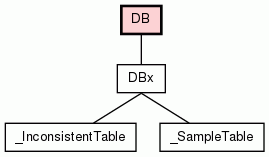
| Trees | Indices | Help |
|
|---|
|
|

Base class for all persistent objects in a sqlite database. Not the normal API. Derived classes need to define a write() method.
| Nested Classes | |
|
__metaclass__ This is used by all the SQL classes, and initializes the class. |
|
| Instance Methods | |||
|
|||
| int |
|
||
|
|||
|
|||
|
|||
|
Inherited from |
|||
| Class Methods | |||
|
|||
| None |
|
||
| None |
|
||
|
|||
|
|||
|
|||
|
|||
| Class Variables | |
S_notinDB = 0
|
|
S_inDB = 1
|
|
S_modified = 2
|
|
SQL_name = |
|
idx = 0
|
|
| Properties | |
|
Inherited from |
| Method Details |
x.__init__(...) initializes x; see help(type(x)) for signature
|
This method writes an instance out to its database. This method should assemble its attributes to form an argument list for _write, and then call _write with that argument list. It should be used like this:
def write(self):
return self._write(self.something, self.other, self.stuff, self.misc)
Notes:
|
Changes to an instance are not written to the database unless you call
make_dirty() or write().
Note:
Global variables are destroyed very late, possibly after other
necessary objects have already been destroyed, so you may not want
to trust that |
This can be called to confirm that the column names in the database matches what the class expects.
|
This creates the table in the database. It is harmless if the table already exists.
|
This should be called when you first open an existing database when you have the intent to write. It sets the initial ID number to be larger than the largest ID in the database. |
| Trees | Indices | Help |
|
|---|
| Generated by Epydoc 3.0.1 on Thu Sep 22 04:25:10 2011 | http://epydoc.sourceforge.net |